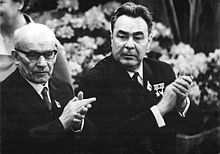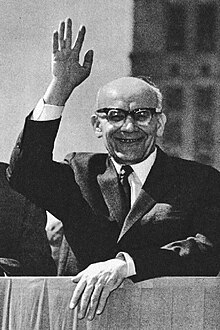Władysław Gomułka
Władysław Gomułka , alias Wiesław, Feliks Duniak (born February 6, 1905 in Krosno , Galicia , then Austria-Hungary , † September 1, 1982 in Konstancin-Jeziorna ) was a Polish politician and party leader of the Polish United Workers' Party (PVAP).
Life
Gomułka was a locksmith and then embarked on a career as a functionary, first in the trade unions, from 1926 in the Communist Party of Poland (KPP). After spending two years in prison from 1932 to 1934 for his activities, he went to the Soviet Union for a year for training . On his return he was arrested again in 1935 and, with interruptions, re-imprisoned until the outbreak of war in 1939. He spent the years 1939 to 1942 in the Soviet-occupied part of Poland in Białystok and Lemberg and, after the German invasion of the USSR, underground. In 1942 he went to Warsaw via his native Subcarpathian region , where he co-founded the Polish Workers' Party ( Polska Partia Robotnicza , PPR) underground.
After the death of two other functionaries, he was appointed general secretary of the party. In the new communist-led government , Gomułka acted as deputy prime minister and minister for the " regained territories ", i.e. the former German eastern territories . Within the Workers 'Party (from 1948 the Polish United Workers' Party) there were soon disputes about the political orientation, in which Gomułka pleaded for a national Polish communist solution. The camp of the close Stalin supporters around Bolesław Bierut , Hilary Minc and Jakub Berman was able to prevail with Moscow support and overthrew Gomułka in autumn 1948 because of alleged right-wing nationalist deviations . In the Stalinist phase that followed, a show trial was prepared against him, but this did not take place. In 1951, however, he was arrested and expelled from the party. In 1954 he was released.
Party leader



After the political unrest escalated in autumn 1956 and party leader Edward Ochab was replaced, Gomułka returned to power triumphantly and with the support of large parts of Polish society and was elected party leader of the Polish United Workers' Party ( PVAP ). The Soviet Union was initially hostile to him, but was ultimately ready to recognize Gomułka after he no longer denounced the Soviet occupation of Poland. On October 29, 1956, he appeared in the stands in front of the Warsaw Palace of Culture from a huge crowd of Warsaw residents and was greeted with a storm.
He slowed the collectivization of private agriculture , which had not yet been carried out under his predecessors , allowed private small businesses to a limited extent and concentrated on the modernization of production that was already state-owned. With this economic strategy , the Polish economy achieved high growth rates in the late 1950s and early 1960s . The supply of essential goods stabilized, and new types of consumer goods such as television and electrical household appliances were soon available in most households. The cities grew rapidly through government housing programs and the development of prefabricated building methods , which peaked in the 1970s.
The downside of this development was an early renewed increase in the state reprisals, which Gomułka had initially loosened, especially against critical intellectuals and the socially influential Catholic Church in Poland . Poland's continued political dependence on the Soviet Union made Gomułka's initially relatively popular government, which many Poles regarded as the lesser evil compared to the Moscow-loyal communists, increasingly unpopular.
Crisis and fall
The student revolts that spread in Europe from the late 1960s onwards and the events in Czechoslovakia intensified dissatisfaction with the Polish government (along with Gomułka, Chairman of the GDR State Council, Walter Ulbricht , Gomułka was one of the most resolute opponents of reform policy in the neighboring country.) From now on, party leader Gomułka began power to slip even within the party itself. In the crisis year of 1968, others, such as Interior Minister Mieczysław Moczar , played the leading role in inglorious events such as the crackdown on student protests and an anti-Zionist campaign.
A final attempt to escape his disempowerment was the rapprochement with the Federal Republic of Germany . On May 17, 1969, Gomułka offered the West German government negotiations. The new Federal Chancellor Willy Brandt picked up this thread, so that the Warsaw Treaty could be signed in early December 1970 . It contained the confirmation of the Oder-Neisse border by the Federal Republic, so that Gomułka's main political goal was achieved. Just two weeks later - after violent labor unrest broke out on the Baltic coast - he was overthrown by his party friends.
Today Gomułka is generally regarded as a relatively credible representative of a national communist course, which also possessed the Polish “stable smell” and never enriched itself. However, incidents such as his order to shoot the Gdansk demonstrators in 1970 had a negative impact.
See also
literature
- Wladyslaw Gomulka: Selected speeches and essays: 1960–1963. Dietz-Verlag, Berlin 1965.
- Anita Prażmowska: Władysław Gomułka: a biography , London: IB Tauris 2016.
Web links
- Literature by and about Władysław Gomułka in the catalog of the German National Library
- Newspaper article about Władysław Gomułka in the 20th century press kit of the ZBW - Leibniz Information Center for Economics .
Individual evidence
- ^ Biuletyn Informacji Publicznej Instytutu Pamięci Narodowej. ipn.gov.pl, accessed March 26, 2019 (Polish).
- ↑ I'm a rascal, Mr. Public Prosecutor! - The hanged make a revolution / On the fate of Laszlo Rajk, Traitscho Kastoff, Rudolf Slansky and other honored dead . Der Spiegel 4/1957 of January 23, 1957, pp. 28-35.
- ↑ Kornelia Lobmeier: When winter came after spring: Prague 1968 and the consequences . museumsmagazin 3/2003 of the foundation "House of the History of the Federal Republic of Germany".
| personal data | |
|---|---|
| SURNAME | Gomułka, Władysław |
| BRIEF DESCRIPTION | Polish politician, member of the Sejm and party leader of the PVAP |
| DATE OF BIRTH | February 6, 1905 |
| PLACE OF BIRTH | Krosno |
| DATE OF DEATH | September 1, 1982 |
| Place of death | Warsaw |
